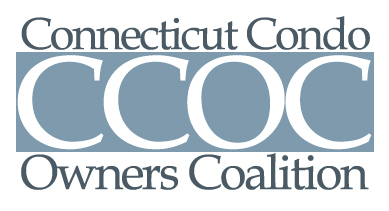New Connecticut Condo Laws To Go Into Affect Oct. 1
New Connecticut condo legislation – which was supported by the CT Condo Owners Coalition [CCOC] – will go into affect on Oct. 1 as part of Public Act 14-215.
Sections of this bill, focusing on voting by board members, resale certificates and increasing penalties for community association managers who violate the law, were presented by CCOC as part of their 2014 legislative package to the Legislature in January of this year.
CCOC submitted written testimony and testified in favor of the bill, recommended some changes, and worked with Representative James Albis, Senator Paul Doyle, and Kim McClain and Atty. Scott Sandler of the Community Association Institute [CAI] to negotiate language for amendments that the legislature adopted.
We want to offer a special note of appreciation to Representative Albis who was instrumental in getting this legislation passed. We would also like to thank the Chairs of the Judiciary Committee where the bill originated: Senator Eric Coleman and Representative Gerald Fox as well as Senator Paul Doyle and the other members of the Judiciary Committee members who offered their support.
Following is a summary of the Act.
VOTING BY BOARD MEMBERS
The bill makes it easier for unit owners to know how well directors are serving their interests by requiring the minutes of executive board meetings to indicate how each board member voted on any final action the board proposed to take, unless the board approved the action unanimously or without any member objecting. (Effective Date: October 1, 2014)
ELECTION OF BOARD MEMBERS
The bill makes it easier to elect board members by establishing a default rule that association directors and officers are elected by plurality vote instead of by majority vote unless the Declaration, other provisions of CIOA or other law requires a higher percentage. Quorum requirements will still have to be satisfied. (Effective Date: October 1, 2014)
RESALE CERTIFICATE
CIOA [Common Interest Ownership Act] requires unit owners to provide a purchaser with certain information before selling a unit. The bill requires that this information also indicate the most recent fiscal period within the preceding five years for which an independent certified public accountant reported on a financial statement and whether that report was a compilation, review or audit. In addition to helping prospective buyers, it is hoped that this provision will pressure boards to maintain better books and accounting standards. (Effective Date: October 1, 2014)
COMMUNITY ASSOCIATION MANAGERS
The law prohibits community association managers from engaging in certain conduct. Violations are punishable by a fine of up to $500, up to a year in prison, or both. The bill increases the maximum fine to $1,000. (Effective date: October 1, 2014)
TERMINATION OF MASTER ASSOCIATIONS
The bill establishes a procedure to terminate certain master associations and transfer the association’s assets to a new non-stock corporation, upon the consent of 25% of the unit owners. This new procedure only applies to master associations: (1) comprised of common interest communities consisting of at least 400 units; (2) governed by a board of directors consisting of one individual representing each constituent common interest community, who is on the constituent community’s board; and (3) whose board has a weighted vote based on the number of units in the constituent community represented by the director. (Effective date: January 1, 2015)
CCOC also supported another bill, HB 5590, “An Act Establishing a Pilot Program for the Mediation of Condominium-Related Disputes. This proposed legislation would have established a pilot mediation program for disputes between unit owners and associations. Although the bill successfully made it out of the Judiciary Committee, the full House or Senate did not act on it apparently because of costs associated with the bill if implemented.
CCOC recognizes that unit owners need a forum to resolve disputes with association boards of directors and community association managers that is more expedient and less expensive than Superior Court. CCOC strongly believes unit owners need a less expensive and faster process to resolve disputes and will continue to look toward possible solutions for this problem and is working on drafting a proposal for the Legislature to consider next year.






THe Owners voted at the Annual Budget Meeting for fertilization of the lawns.
The Board cancelled the Fertilization to use the money elaewhere and did not record when they did it and why. Can they do this?
They are required to publish their votes.
The Board does not record dicesions or details of the action they are taking. They also delay the minutes of the meeting by a number of months. WHat can be done about that?
You can always vote in a new board.
It doesn’t matter. Nothing will ever matter, and I wish I never bought the moldy gross dump I live in in Avon Ct .
Towpath . Condo fees 474.00.
“Run” by Elite PM in Farmington .
Yes until there is an active oversight committee that aggressively investigates complaints and issues real repercussions, the private board type associations will continue in their cheating/deceptive practices
I appreciate everything the CCOC has done to fight for the rights of condo owners. Finally, Boards do have rules and regulations hanging over them and unit owners have somewhere to go for advise. My condo association, Cedar Knolls will not give us an email address. We have to write a letter for every issue or complaint we have. Then we have to wait to hear from someone which could and has taken weeks. I lost a contractor because it took so long for me to tell him when to come here that he took another job. We have a terrible management company – Whitney Mgt. which our previous management company – Prime Properties merged with.
Written complaints/requests are much more efficient than making a phone call. And, once written there can be no “I didn’t ask for that.” Written complaints eliminate the he said she said that occurs when one is dissatisfied with an outcome. Once written it becomes a matter of record. The resident will always have a written record of the response since Prime/Whitney Management always responds in writing. Businesses who use emails as a major source of communication become vulnerable to viruses, scammers and hackers. That could potentially put a company out of business for awhile. If Target and Wells Fargo can be hacked, just think how easy it would be to get into Prime/Whitney Management system.
Perhaps if the resident familiarized her/himself with procedure before contacting a contractor, this situation could have been avoided.
Successful condo complexes depend on communication and cooperation. Sounds like Prime/Whitney Management is trying to do that, however, there are always those who resist.
Hi—will you please send me a copy of the bill that went into effect on Oct.1,2013, inre to receiving a monthly financial statement from our bod. I received one for that initial month and although I’ve made numerous requests this past year, I’ve not received any more. I am a CCOC member and did get the newsletter pertaining to this but cannot find it.
Thankyou, Mae
Please check http://www.ctcondonews.com, you can download it from the first story.
Bill effective 10/1/14 COMMUNITY ASSOCIATION MANAGERS
“The law prohibits community association managers from engaging in ‘certain conduct’. Violations are punishable by a fine of up to $500. . . ”
This is a vague statement. What “certain conduct” is considered in violation?
concerned condo owners need to attend public hearings and raise up a new bill, give a written or oral testimony at the pubic hearing. We are living it, so we need to be active. Learning…
Went into EFFECT, not affect.
Jebus! Who, if anyone, proofreads this stuff?
Can a board limit the length of time for “public comment” at a board meeting
yes
The Landscaper for our Condo association used Chainsaws to cut down and butcher our hedges in our Community of approximately 100 units. The chain saws damaged the vinyl siding on most of the buildings from the heat. I reported this a year ago to the Management Company and Board. I then showed the board President and management Company the damage in Person. I asked over two months ago at a board meeting what was going on with the damage …the Landscaper should be insured to cover it. This Landscaper also does our plowing and he does both poorly. It is very suspicious…the management company and board are incompetent…what are my options…I would love to get the whole board out but no one at the complex can be bothered to take any action. Is there somewhere I can report this to the state..etc?
Unfortunately no. Removing the board is your only option.
Is it against the law to have a family member of a hired person by the condo,who does the financials, be the person that does the financial audit?
Thanks
MP
No law against it, but its pretty stupid.
Can an owner of a condo unit have a representative attend board meetings and speak about issues? The board says they can’t. Only owners may speak. Is this legal, or has legislation been passed to allow representatives speak?
There is no law on this issue. It is totally at your board’s discretion.
Then what good is Chapter 828, Section 47-250(b)(1) that states: “Meetings shall be open to the unit owners and to a representative designated by any unit owner except during executive sessions.” What value does said ‘representation’ have?
What % do you need to ratify a special assessment?
Is there a law or a guideline that requires/suggests how often an audit or a financial review must be done? My association has not had a review in 5 years and I do not believe that an audit has ever been done.
I am not aware of any law. The only guideline would be your association’s rules.
My community is comprised of 9 separate associations because it was built over 45 years. The Roads and Rec committee is comprised of the presidents of these 9 boards. some roads are old and a study is in process regarding their replacement. The unit owners will be assessed on their square footage. Is there a statute that supercedes local rules saying unit owners should be assessed EQUALLY and NOT psf because it is unfair when the amount of road is the approximately the same in front of each unit? Thanks
Our condos were built in the 70’s how far in advance do they need to send out the Proposed budget before the budget meeting is held? Our envelope was post marked on Friday November 8th & we received it on the November 14th due to the post office being closed on Veterans Day for the long weekend. Our meeting was held on November 20th for the budget. So we only had the budget in hand for 7 days before the meeting. This just doesn’t seem right? Any help would be appreciated.